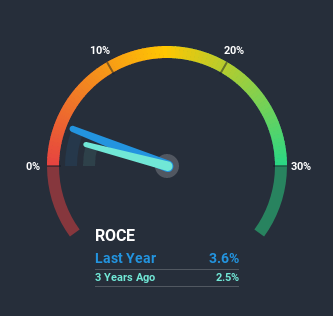- Hong Kong
- /
- Entertainment
- /
- SEHK:1740
Returns On Capital At Values Cultural Investment (HKG:1740) Paint A Concerning Picture

What trends should we look for it we want to identify stocks that can multiply in value over the long term? One common approach is to try and find a company with returns on capital employed (ROCE) that are increasing, in conjunction with a growing amount of capital employed. Basically this means that a company has profitable initiatives that it can continue to reinvest in, which is a trait of a compounding machine. However, after investigating Values Cultural Investment (HKG:1740), we don't think it's current trends fit the mold of a multi-bagger.
Return On Capital Employed (ROCE): What is it?
For those who don't know, ROCE is a measure of a company's yearly pre-tax profit (its return), relative to the capital employed in the business. To calculate this metric for Values Cultural Investment, this is the formula:
Return on Capital Employed = Earnings Before Interest and Tax (EBIT) ÷ (Total Assets - Current Liabilities)
0.036 = CN¥16m ÷ (CN¥489m - CN¥34m) (Based on the trailing twelve months to December 2020).
So, Values Cultural Investment has an ROCE of 3.6%. Ultimately, that's a low return and it under-performs the Entertainment industry average of 13%.
Check out our latest analysis for Values Cultural Investment

Historical performance is a great place to start when researching a stock so above you can see the gauge for Values Cultural Investment's ROCE against it's prior returns. If you want to delve into the historical earnings, revenue and cash flow of Values Cultural Investment, check out these free graphs here.
The Trend Of ROCE
When we looked at the ROCE trend at Values Cultural Investment, we didn't gain much confidence. To be more specific, ROCE has fallen from 19% over the last four years. And considering revenue has dropped while employing more capital, we'd be cautious. This could mean that the business is losing its competitive advantage or market share, because while more money is being put into ventures, it's actually producing a lower return - "less bang for their buck" per se.
On a related note, Values Cultural Investment has decreased its current liabilities to 7.0% of total assets. That could partly explain why the ROCE has dropped. Effectively this means their suppliers or short-term creditors are funding less of the business, which reduces some elements of risk. Since the business is basically funding more of its operations with it's own money, you could argue this has made the business less efficient at generating ROCE.
The Key Takeaway
In summary, we're somewhat concerned by Values Cultural Investment's diminishing returns on increasing amounts of capital. Long term shareholders who've owned the stock over the last year have experienced a 20% depreciation in their investment, so it appears the market might not like these trends either. With underlying trends that aren't great in these areas, we'd consider looking elsewhere.
Values Cultural Investment does have some risks, we noticed 4 warning signs (and 1 which is a bit concerning) we think you should know about.
While Values Cultural Investment may not currently earn the highest returns, we've compiled a list of companies that currently earn more than 25% return on equity. Check out this free list here.
When trading Values Cultural Investment or any other investment, use the platform considered by many to be the Professional's Gateway to the Worlds Market, Interactive Brokers. You get the lowest-cost* trading on stocks, options, futures, forex, bonds and funds worldwide from a single integrated account. Promoted
If you're looking to trade Values Cultural Investment, open an account with the lowest-cost platform trusted by professionals, Interactive Brokers.
With clients in over 200 countries and territories, and access to 160 markets, IBKR lets you trade stocks, options, futures, forex, bonds and funds from a single integrated account.
Enjoy no hidden fees, no account minimums, and FX conversion rates as low as 0.03%, far better than what most brokers offer.
Sponsored ContentNew: Manage All Your Stock Portfolios in One Place
We've created the ultimate portfolio companion for stock investors, and it's free.
• Connect an unlimited number of Portfolios and see your total in one currency
• Be alerted to new Warning Signs or Risks via email or mobile
• Track the Fair Value of your stocks
This article by Simply Wall St is general in nature. It does not constitute a recommendation to buy or sell any stock, and does not take account of your objectives, or your financial situation. We aim to bring you long-term focused analysis driven by fundamental data. Note that our analysis may not factor in the latest price-sensitive company announcements or qualitative material. Simply Wall St has no position in any stocks mentioned.
*Interactive Brokers Rated Lowest Cost Broker by StockBrokers.com Annual Online Review 2020
Have feedback on this article? Concerned about the content? Get in touch with us directly. Alternatively, email editorial-team (at) simplywallst.com.
About SEHK:1740
Values Cultural Investment
An investment holding company, engages in the production, distribution, and licensing of broadcasting rights of television (TV) and web series in Mainland China.
Adequate balance sheet low.
Market Insights
Community Narratives



